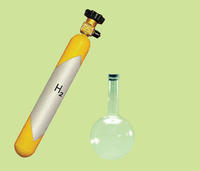The chemical element hydrogen (H-Hydrogen), which is the first in the periodic table, is the smallest of all atoms. As is well known, hydrogen molecules and oxygen Hydrogen (H2) Molecularization of synthetic water, the usual elemental form of hydrogen is hydrogen (H2), which is a colorless, odorless, highly flammable diatomic gas, and hydrogen is the lightest gas. In standard conditions (0 degrees Celsius and one atmosphere), the hydrogen per liter is only 0.0899 grams - only two-tenths of the same volume of air. Hydrogen is the most common element in the universe. Hydrogen and its isotopes account for 84% of the total mass of the Sun, and 75% of the mass of the universe is hydrogen. Hydrogen has high volatility, high energy, is an energy carrier and fuel, and hydrogen is also widely used in industrial production. The industry now uses 550 billion cubic meters of hydrogen per year. Hydrogen is used together with other substances to make ammonia and fertilizers. It is also used in gasoline refining processes, glass polishing, gold welding, weather balloon detection and the food industry. Liquid hydrogen can be used as a rocket fuel because the liquefaction temperature of hydrogen is -253 °C. Hydrogen energy is likely to become a pivotal secondary energy source in the world energy arena in the 21st century. It is an extremely superior new energy source. Its main advantages are: high calorific value of combustion, calories after burning per kilogram of hydrogen, about three times that of gasoline, 3.9 times that of alcohol, and 4.5 times that of coke. The product of combustion is water, the cleanest source of energy in the world. Rich in resources, hydrogen can be produced from water, and water is the most abundant resource on the earth, deducting the classic process of natural material recycling and sustainable development. 100g 200g Big Containers,50G Cosmetic Jars,100g Frosted Jar,Plastic Big Containers Shaoxing Dingsheng Plastic Products Co..Ltd. , https://www.dingshengpacking.com
Introduction to hydrogen energy
Hydrogen energy is the energy produced by the reaction of hydrogen and oxygen. Hydrogen is the chemical energy of hydrogen. Hydrogen is mainly formed in the form of chemical states on the earth. It is the most widely distributed substance in the universe. It constitutes 75% of the mass of the universe and secondary energy. There are many ways to produce hydrogen in the industry. Commonly, hydrogen production by water electrolysis, hydrogen production by coal gasification, heavy oil, and catalytic conversion of natural gas to steam are used to produce hydrogen.
